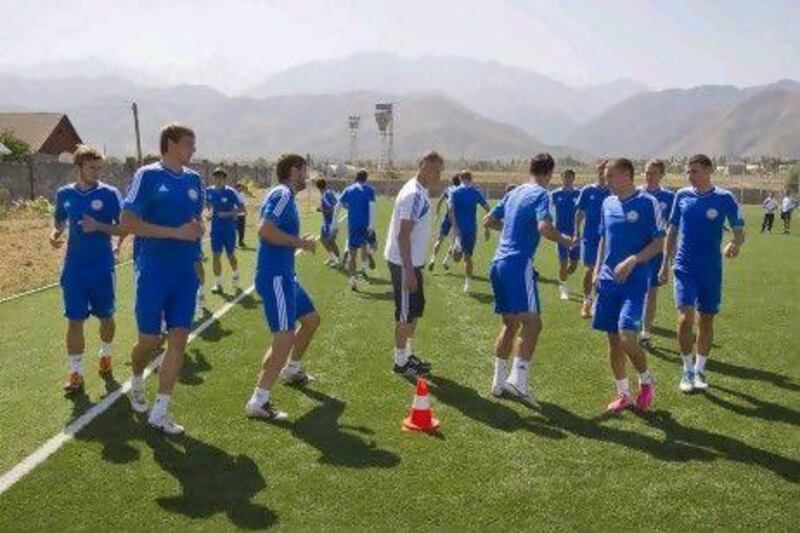Drive 300 kilometres from the Kazakh national team's training complex and you will reach China. But when it comes to football, the former Soviet republic prefers to look the other way: Europe.
Ten years have passed since Kazakhstan, an oil-rich country five times the size of France, joined Uefa. Within the next decade, the country hopes a German-inspired youth development plan will have it knocking on the door of a major tournament.
"I wouldn't say Asian teams are weaker opponents - there are a lot of good teams - but it's better to be in Europe," said Kairat Nurdauletov, the national team captain.
"When you play at Wembley or in Turkey, when the stadium is full and you can't hear yourself think, that's when you really feel like you're a footballer," the 29-year-old midfielder said.
Kazakhstan joined Uefa in April 2002, having resigned its membership of the Asian Football Confederation the previous year. Nurdauletov was an unused substitute during the match he describes as Kazakhstan's biggest achievement since: a 2-1 defeat of Serbia in March 2007.
The last decade, however, has also been roiled by political intrigue. The former head of the football federation, Rakhat Aliyev, the son-in-law of Nursultan Nazarbayev, the president, fled the country after falling out with Kazakhstan's powerful leader.
The new-look federation has recently embarked on a 10-year plan to develop youth football, based on the German model. The German Football Federation will even supervise a programme to install a youth centre at every Premier League club next year.
"In Germany, it's normal for every club to have something like this," said the midfielder Heinrich Schmidtgal. "Here, they're a few years behind, but something is being done."
The countries are bonded by the large ethnic German population inherited by Kazakhstan after independence from the Soviet Union, descendants of the Volga Germans exiled to the steppe by the Soviet leader Josef Stalin after the Second World War.
Schmidtgal, 26, was born in Kazakhstan but spent most of his childhood in Germany. His career in the Bundesliga, where he plays for newly promoted Greuther Fuerth, is a frequent topic of conversation with teammates in the Kazakh national side.
"I tell them the level is very high, that you have no time in the game to think about what you're going to do," he said.
Germany are favourites to top a World Cup qualifying group that also includes Sweden, Austria and Ireland. Kazakhstan's modest goal is to finish above the Faroe Islands, ranked 12 rungs below their 142nd place in the latest Fifa rankings.
"We are outsiders," said the country's Czech coach, Miroslav Beranek, "but we don't want to play like outsiders."
Beranek, 52, was assistant to revered coach Karel Bruckner for the swashbuckling Czech side captained by Pavel Nedved that reached the semi-finals of the 2004 European Championships.
He communicates in accented Russian, rolling passes to his players during shooting practice at the modern training complex beneath the 4,000-metre peaks of the Tien Shan mountain range.
The secluded Talgar complex, with a hotel, gym and massage rooms, is part of the federation's investment in new facilities. Since 2009, home matches have been played at the 30,000-capacity Astana Arena, a stadium in keeping with the futuristic skyline of a capital city built on abundant oil wealth.
A separate youth development programme brokered by Nazarbayev has also sent some of Kazakhstan's most promising teenagers to the Ole Brasil football academy in Sao Paulo state.
Despite lofty ambitions, Kazakhstan still ranks far below its Central Asian neighbour Uzbekistan, 70th in the Fifa world rankings and a finalist in Asia qualifying for Brazil 2014.
Kazakh officials argue that Uzbekistan's ranking, relative to their own, is boosted by a greater amount of matches against weaker opposition. Experience gained by playing Europe's leading sides will improve the level of Kazakh football, they say.
The expansion of the 2016 European Championship to include 24 teams, eight more than in previous tournaments, has also given a sliver of hope that qualification might be within reach.
"That target is a few years away, but for every small team it's a big chance to get into the Euros," said Schmidtgal.
When Kazakhstan was lobbying for Uefa membership a decade ago, it argued the fact that 12 per cent of its territory lies in Europe. Using the same argument, Turkey is three per cent European.
The country's Soviet heritage also played a role. For a large proportion of Kazakhstan's 17 million people, Russian is still the first language.
A source in the federation compared the standard of today's Kazakh Premier League to its Russian equivalent six or seven years ago. Following in Russia's footsteps, Kazakhstan will also switch to an autumn-spring calendar from next season.
Wages at the top clubs in the Kazakh Premier League average about US$15,000 (Dh55,100) a month, although the highest-paid players can earn double that amount.
The ultimate goal for the nation of 17 million is to become a footballing nation more similar to Germany and England than to japan and South Korea.
Said a federation official: "We want to evolve in the same way as European countries."
Follow us
[ @SprtNationalUAE ]





